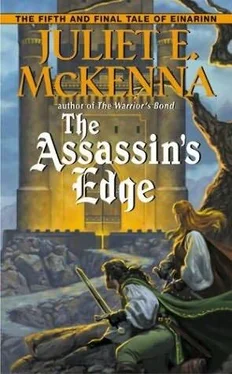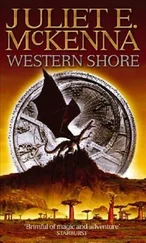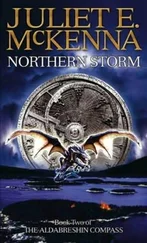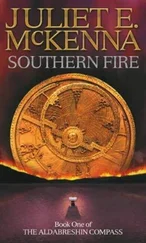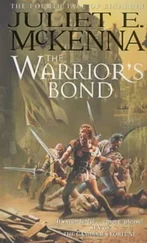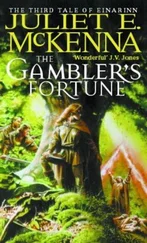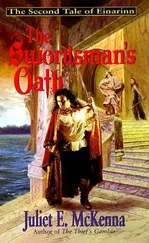“We’re leaving.” Temar gestured to Halice. The Dulse surged forward, heeling away from the single-masted ship. Temar hurried to the afterdeck, to keep the pirate in sight. “None of you let any magelight slip,” he said anxiously as Usara joined Larissa and an implacable swell gathered to drive Muredarch back between the islands.
The mages looked at each other with some amusement. “No, we’ll be careful,” Larissa assured him.
“I wish I knew I could set a magic working and just leave it like that.” Guinalle watched the seas push the sloop down the strait.
“It’s not an easy as it looks,” Usara said with feeling. “And a spell left unchecked can cause chaos, believe me. Azazir—”
“Magical theory can wait.” Halice tapped him on the shoulder. “Where does this leave us, Messire?”
“He won’t leave things like this, will he?” Temar gnawed on a thumbnail. “We make sure he goes nowhere and see what he comes up with next time?” He looked for agreement.
“He certainly thinks you’ll trade something for the prisoners,” Guinalle said slowly.
“Can we ask for Naldeth by name?” asked Larissa, hopeful.
“Not without Muredarch doubling whatever price he puts on his head,” Halice told her tartly.
“I would not make any deal with him, over anyone,” Guinalle said with evident distress. “He has no intention of keeping his word about anything.”
“I hardly need Artifice to tell me that,” said Temar without thinking. He smiled hastily at her but Guinalle was too preoccupied to notice.
“He’s a pure opportunist,” she continued. “No fool and not given to ill-considered impulse, so we mustn’t make that mistake. He can plan ahead and on a grand scale; he’s determined to make himself overlord of some free traders’ fiefdom in these islands. He’s quite confident he can do it. But that’s as much as he intends. He doesn’t see himself ruling Kellarin for instance, just plundering it judiciously.”
“Where do the Elietimm fit in to his plans?” demanded Temar.
“He really has no idea what he’s dealing with.” Surprise and concern coloured Guinalle’s reply. “He sees them as a tool for his use and believes them entirely loyal to his ambitions.” She smiled without humour. “They have made sure of that. As far as Muredarch knows, Ilkehan is sole ruler of another group of islands, a predator on trade and the Dalasorian coasts much the same as himself, just more successful at keeping himself hidden. He sees him as an equal and a potential ally in gaining a stranglehold on as much ocean trade as possible.”
“So what do we do now?” Temar looked from Usara to Halice and back again.
Halice didn’t seem to see it warranted a question. “Keep them penned in until Ilkehan’s dead. Go in and kill the lot of them.”
“Couldn’t we trade a few things?” Guinalle pleaded. “Not enough to get a ship seaworthy but just to get a few people safely out of there.”
“This isn’t a game of Raven,” Halice warned her. “Don’t try being too clever; we’re dealing with real lives and deaths.”
“We want him concentrating on us, don’t we?” Temar looked at her. “Even with this other Elietimm leader’s help, it going to take time for Livak and Ryshad to reach Ilkehan’s keep. Then they’ve to find some way of killing the man. Keeping him talking might keep that pirate off balance. Then our final attack will be all the more effective, if they’re wrong-footed.”
Halice nodded with a twinkle in her eye. “A fair point, for someone trained in the Imperial cohorts.”
“If Muredarch’s concentrating on us and our deeds, those enchanters will be doing the same,” Usara said seriously to Guinalle who was still looking upset. “That should draw Ilkehan’s attention south and lessen any chance of him suspecting attack closer at hand. Do you want to sit down? Shiv was showing me how he helped Livak—”
But the noblewoman shook off his hand and went to stand at the very stern of the Dulse , looking out over the waves towards Suthyfer.
“Come on, ’Sar.” Temar ducked as the mizzen sail unfurled above him with a rattle of canvas and ropes. “Let’s get back to our island and work out how best to make Muredarch’s life difficult, shall we?”
Thoughts on the Ancient Races Presented to the Antiquarian Society of Selerima
By Gamar Tilot, Scholar of the University of Col
As students of history in our various degrees, we are invited to regard the ancient races of our lands as set apart, an impassable gulf of time dividing their lives from our own and rendering them unknowable. Why must they be so very different from ourselves? I argue these peoples are as easily understandable as the gentleman sitting beside you in this hall. Consider the question thus.
The Forest Folk of old are known through the ballads of wandering minstrels and the legends we tell our children. We entertain ourselves with tales of unicorns and griffons, with myths of women born from living trees and unearthly voices heard in dark and sacred groves. We imagine the people living with such wonders as innocent as children, unfettered by possessions, blithe in romances uncomplicated by marriage or settlements. Such an ideal life is a wonder that has passed beyond our ken.
But who sings us these songs? Why, travelling bards who come out of the Forest, boasting that same red hair celebrated in every chorus. They leave greenwood families living not in indolent ease but in the straitened circumstances of any who must forage for food among root and bough. Minstrels carolling the romances of Viyenne or Lareal do not exalt a lost ideal but merely solicit coin to clothe their children and fill their bellies with bread. Their songs are not mystical history but idle entertainment, to distract their folk from their own cold and hungry existence. Look around your city and you will see plenty of copper-crowned heads. Over the generations, many a Forest man has forsaken the woods for the practical comforts of settled life and trade. The Forest Folk are not distant paragons of a nobler age; they are your tradesmen, your servants. We all share the same concerns for our children, our prosperity, and our posterity. Those so inclined worship the same gods. Why should we imagine it was not ever thus? One can tell a tree by its fruit, after all and the apple never falls far from the tree.
Consider the Mountain Men. Read the sagas copied in the libraries of Vanam and Inglis and you see a race remote and forbidding as the very peaks of Gidesta. Incomprehensible myths speak of men unyielding as stone, dangerous as dragons reputed to haunt their peaks. Scholars nod wisely of the cruel climate that makes such men so harsh. The miners and trappers among the hills and forests north of the Dalas would laugh at such wilful ignorance. Where have the towns of northern Ensaimm learned their noted skills in smelting and smithing if not from the countless sons of Mountain blood who have settled in softer climes and married there, quite content with their lot? There can be no such great differences between us if they do not divide those sharing the honesty of the marriage bed. Tales of ancient warfare among the snowbound crags may send a shiver of steel down the spine when told around a fireside but the truth is that the Mountain Men are as familiar and as slight a threat as the knife you use to cut your meat at table.
What though of the Plains People? That is the greatest mystery of all, or so it is whispered around the chimney corners. We see no trace of them, only gazing in awe at the earthen walls that ring their sacred places, at mighty barrows raised above their honoured dead. Gentlemen such as yourselves dig into these and wonder at copper pots and axes. Why were they buried? Did they truly believe such possessions could be carried aboard Poldrion’s ferry? Every discovery turns up more questions than pebbles. The earth-stained bones cannot speak so we invent answers for the silent skulls. Just as children make monsters out of fear and the shadows cast by candles, so we weave the darkness of ignorance into the myth of the Eldritch Kin, masters of a realm beyond the rainbow, rulers of the unchancy lands of water meadow and sea strand, the Plains People gone away into the twilight where we cannot follow.
Читать дальше
